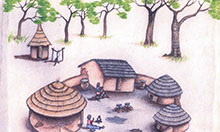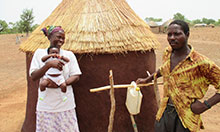A Chief’s Wife Champions SPRING’s WASH 1,000 Approach

A Village with Nowhere to Go
Residents of the Toroyili community of Ghana’s Tolon District now regularly practice the good hygiene they need for better nutrition and health. But that wasn’t always the case. Before 2016, Toroyili had no sanitation system or latrines. Community members practiced open defecation and did not regularly wash their hands because there were no facilities available. It was common to find domestic animals eating from children’s food bowls, possibly contaminating the food and exposing the children to animal feces, which can lead to lead to environmental enteropathy, a condition characterized by the poor absorption of nutrients and impaired growth.
Help from a Hygiene Champion
All of this was before the village chief’s wife, Memunatu Alhassan, participated in a water, sanitation, and hygiene (WASH) program implemented by SPRING. Memunatu quickly became a passionate and active champion for SPRING’s WASH 1,000 approach. Targeting 1,000-day households (those with pregnant women or children under age two), the approach focuses on community-led total sanitation (CLTS) and the adoption of four key behaviors—
- handwashing at critical times
- clean play spaces for kids
- safe drinking water
- appropriate disposal of adult and child feces.
Because of her status in the community, Memunatu’s early adoption of WASH 1,000 was critical. She constructed a latrine and two tippy taps (handwashing stations easily assembled with local materials), one inside the household compound and the other near the latrine to help family members wash their hands after working with animals or in the fields, after using the latrine, and before eating. Worried that her children might eat feces from the family’s chickens, she took SPRING’s behavior change messages to heart and now feeds her flock outside the family’s living compound and regularly tidies the yard to create a cleaner play space for her toddler.
I clean the yard every day so that the little children don’t eat the chicken feces.
-Memunatu Alhassan, wife of the chief of Toroyili, Tolon District, who is championing WASH 1,000 in her community.
“When the little children eat the chicken droppings, they get sores in their mouths and sometimes fall sick. Chicken feces are not good for children, and so I now clean the yard every day so that the children don’t eat the feces,” Memunatu says.

Mobilizing Community Members
Memunatu isn’t just taking action at home; she’s also championing the WASH 1,000 approach throughout her community by educating neighbors on WASH 1000 behaviors, visiting households to ensure proper practices, organizing communal labor to keep the community clean, and attending mother-to-mother support groups to enforce messages.
After advocacy by Memunatu, SPRING/Ghana, and district environmental health officers, the Toroyili community constructed 10 latrines for 10 households and 13 tippy taps with soap for handwashing. Community members are also making a conscious effort to reduce exposure to animal feces by feeding chickens outside of the household compound, washing their hands before feeding their children, and watching older children closely when left to eat on their own. Environmental health officers supported by SPRING teach households to give boiled water to children between 6 and 24 months and encourage other WASH 1000 behaviors. The officers visit households, interact with them, and conduct community-wide meetings on the importance of providing safe drinking water to children. SPRING staff members and government workers conduct follow-up visits to the Toroyili community to ensure residents maintain the changes they’ve made to improve the nutrition and health status of their 1,000-day households. Toroyili has also achieved open-defecation free (ODF) basic status and will undergo the regional verification process for full status this year.
SPRING works in 300 communities across 15 districts in Ghana to promote multi-sectoral actions to improve nutrition. In 2017, an additional 105 communities continued SPRING’s scale-up of activities, complementing regional and national work.

